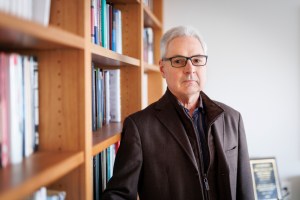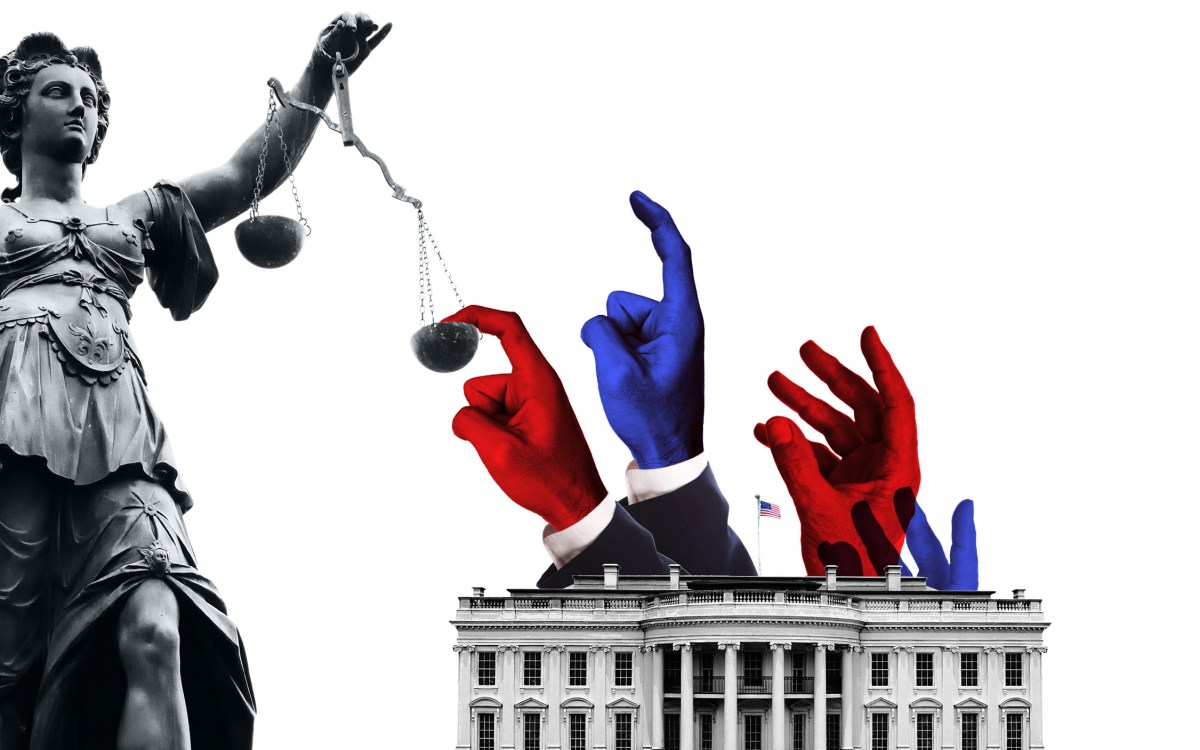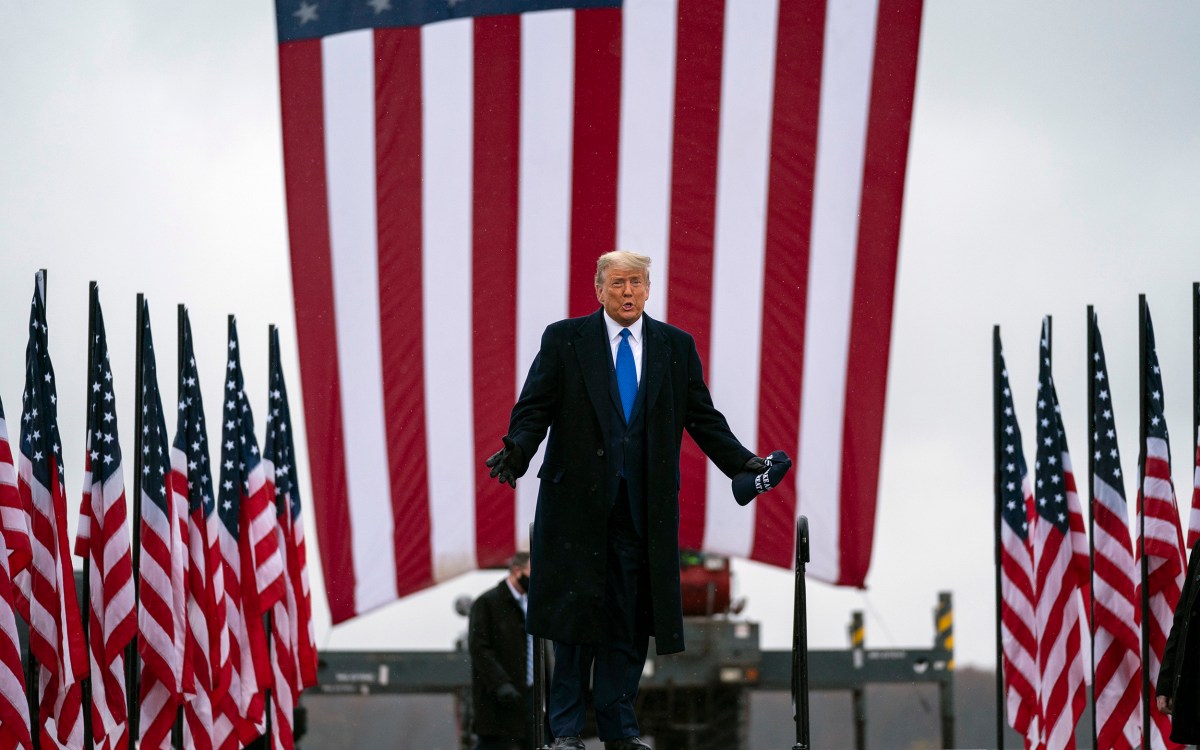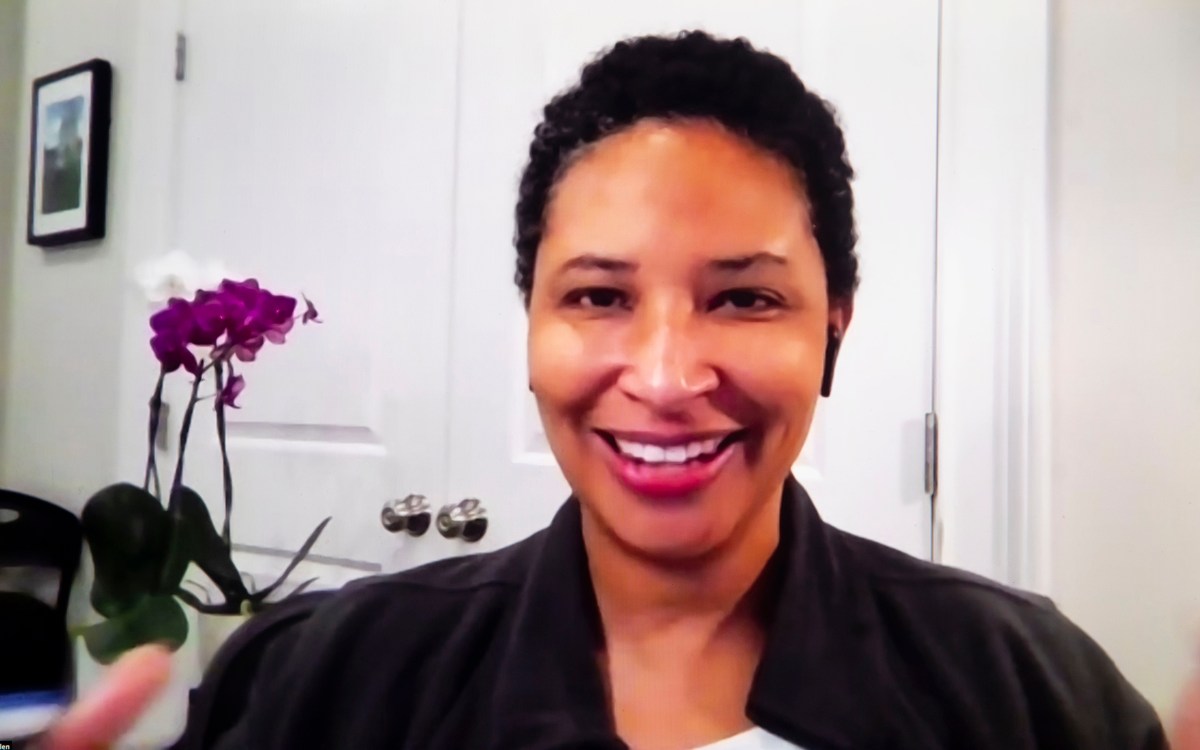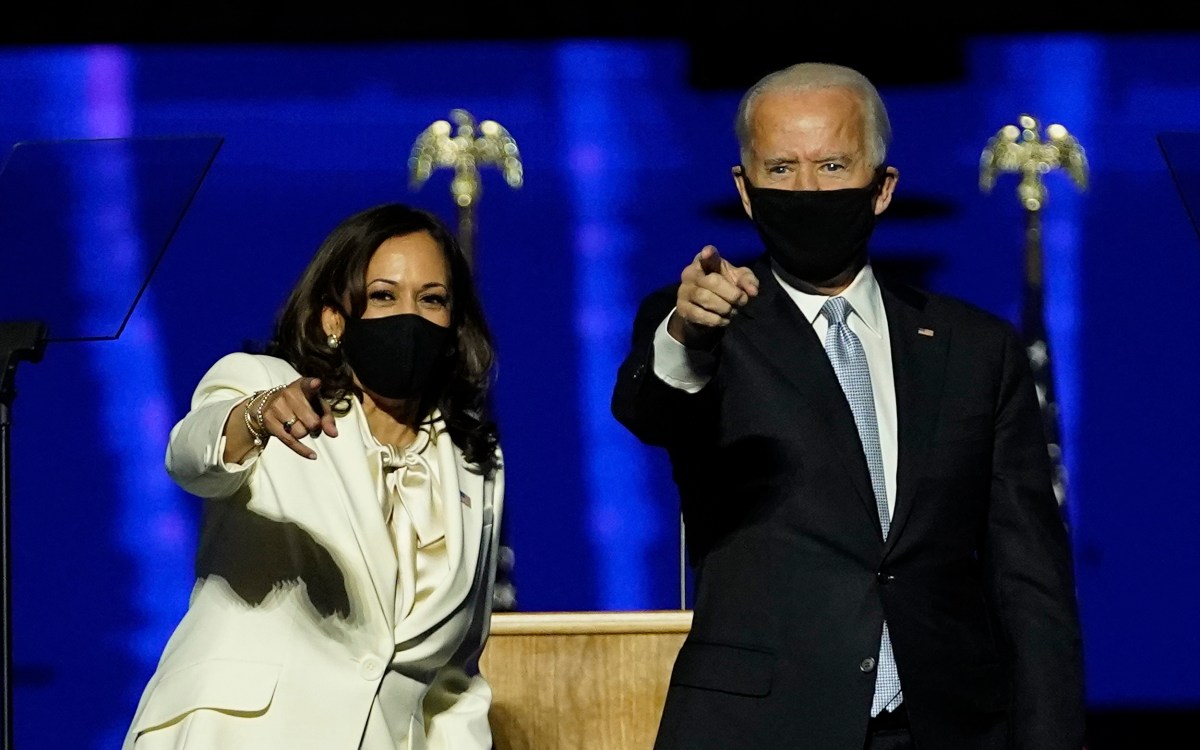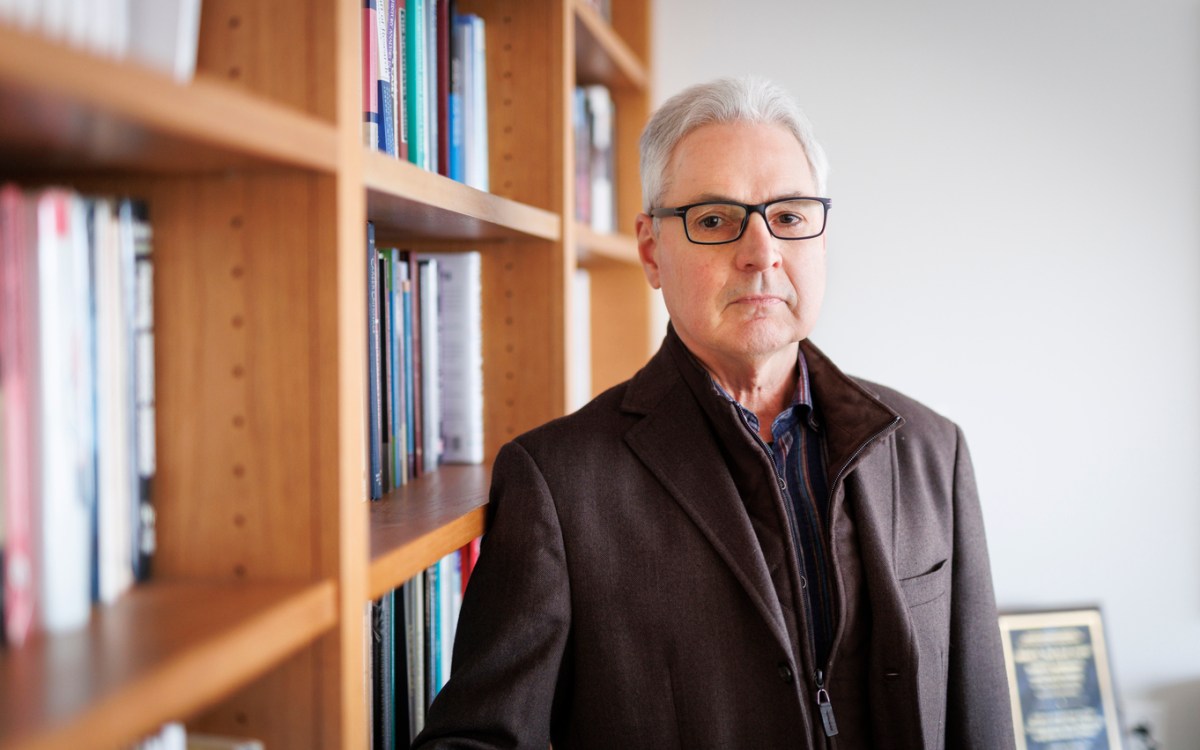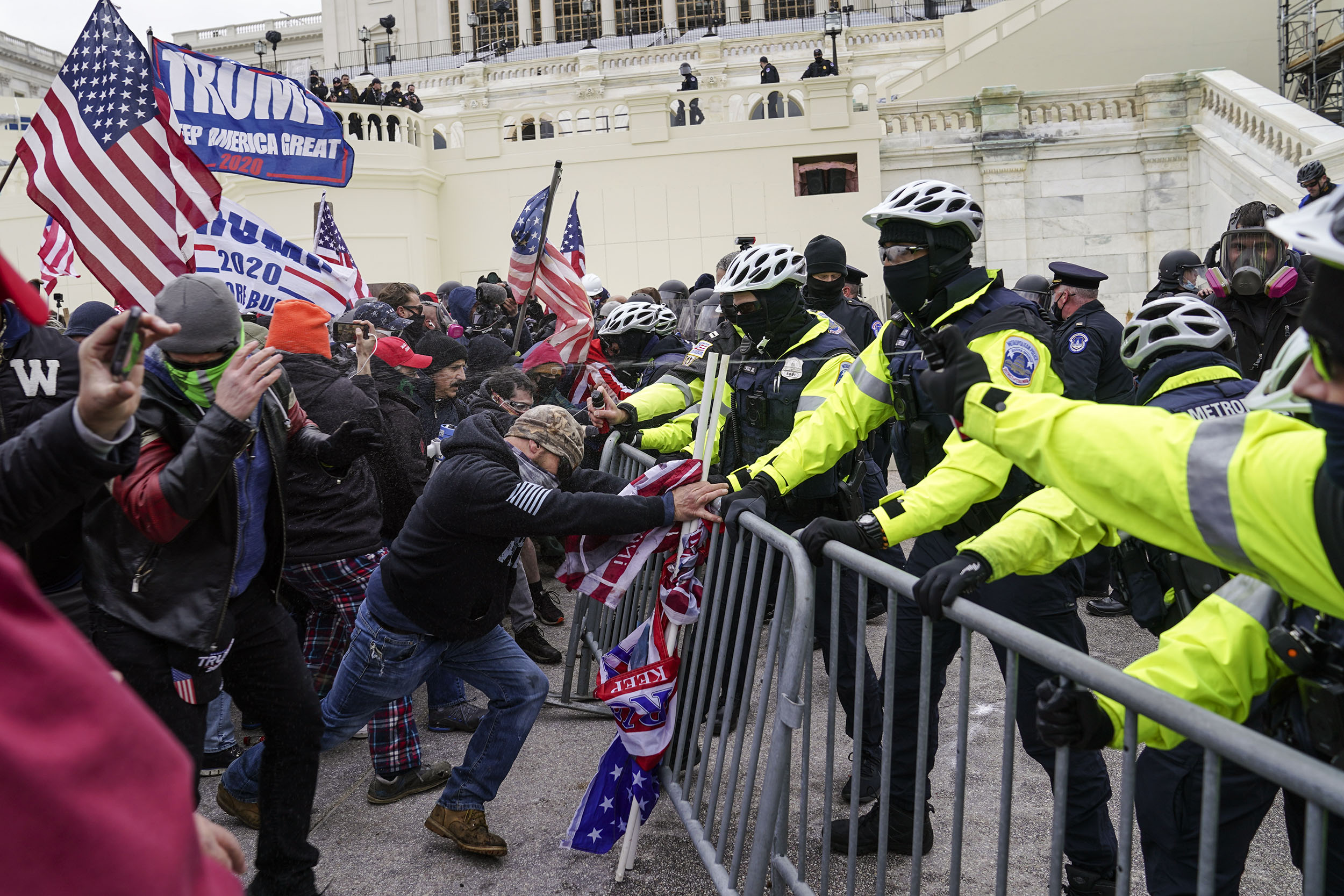
As Congress prepared to affirm President-elect Joe Biden’s victory on Wednesday, thousands of people gathered at the Capitol to show their support for President Trump and his claims of election fraud.
AP Photo/John Minchillo
Concern over storming of the Capitol
Bacow, Harvard faculty, students call for affirmation of American principles
Rarely have images of unchecked bedlam and violence between security forces and angry Americans stunned the nation the way they did Wednesday, as right-wing rioters stormed the U.S. Capitol in Washington.
The rioters attacked the literal and figurative symbols of American government in support of their preferred leader, outgoing President Donald Trump, who earlier had lauded their backing from a stage in front of the White House. They had come to protest the formal counting of Electoral College votes by Congress, a constitutionally mandated ceremony to certify Joseph R. Biden and Sen. Kamala Harris as the next president and vice president-elect.
After the rally with Trump, the angry mob attacked the Capitol while Congress was in session. Members of Congress had to be evacuated, as agitators roamed the halls, vandalizing offices and cavorting in congressional chambers. One woman, a Trump supporter, was shot and killed. The spectacle horrified millions of Americans watching on television and prompted widespread condemnation, including at Harvard.
Harvard President Larry Bacow denounced the mayhem, calling it “an incomprehensible spectacle in the heart of the nation.”
“The rioters who forced their way into the Capitol assaulted the democratic process and endangered public servants who have devoted themselves to the defining work of our democracy — carrying out the will of the people,” he said.
“The future of our republic depends on our willingness to defend the values that brought it into being. The time has come for people of every political persuasion to denounce the lies, lawlessness, and violence that have brought our nation to the brink of constitutional crisis. As members of a university community dedicated to truth, learning, research, debate, and service, we condemn ignorance and hatred, and stand in support of the rule of law and the role of knowledge.”
“What we saw today was an attack on the legislative foundations of our democratic republic and an attack on the popular sovereignty that legitimates our democratic republic.”
Daniel Carpenter
Several Harvard faculty members, authorities on American governance, denounced the takeover as a shameful watershed for U.S. democracy, however divided people may be politically.
“What happened today was not merely the storming of our Capitol building, horrible enough as that is and something essentially unwitnessed since the British sacking of Washington in 1814. What we saw were two things that are fundamentally incompatible with a republic,” said Daniel Carpenter, Allie S. Freed Professor of Government. “First, a faction incited by our executive shut down the body that makes our laws. This is a grave attack on the separation of powers. It is in monarchies and Cromwellian autocracies, not democratic republics, that strongmen prorogue or stop the meetings of representative legislatures. Second, that faction also halted the process of certifying the Electoral College vote. The factional attack succeeded in delaying that certification.
“So, what we saw today was an attack on the legislative foundations of our democratic republic and an attack on the popular sovereignty that legitimates our democratic republic. [And] for a moment, it succeeded,” he said.
President Trump may have overplayed his hand with the day’s abhorrent events and driven most Republicans finally to turn their backs on him, said government professor Steven Levitsky.
“You saw [Mitch] McConnell give a speech that could’ve been taken from my book — obviously utterly hypocritical, but it’s a good thing when Republicans are finally embracing constitutional practices,” said Levitsky, co-author of the 2018 bestseller “How Democracies Die” with Daniel Ziblatt, Eaton Professor of the Science of Government. “So, I think we may see the bulk of the Republican Party climb back on the boat.”
During President Richard Nixon’s final days in office, Republican Senator Barry Goldwater famously led a small group of colleagues to the White House to tell Nixon it was time to step down or face expulsion. In Latin America and other countries that Levitsky studies, political strongmen rarely leave office of their own accord and have to be pushed.
“When a president makes an egregiously failed power grab like this, presidents usually resign. Someone usually taps them on the shoulder and tells them ‘you have to resign,’ and that’s not going to happen here,” he said.
With Americans, including the nation’s political leaders, deeply polarized, the Capitol insurrection was the “physical manifestation” of political division that long preceded Trump and makes clear how fragile America’s democratic institutions and practices truly are as a result, said Archon Fung, Winthrop Laflin McCormack Professor of Citizenship and Self-Government at Harvard Kennedy School.
“Even though this day ended darkly, it began with a victory for [Senators-elect Jon] Ossoff and [Rev. Raphael] Warnock in Georgia.”
Laurence Tribe
“I think today’s events are certainly the most recent and perhaps the sharpest evidence of the weakness of those institutions and practices,” he said.
Though the critical reaction to the uprising is likely to dominate for the near term, Fung worries that people will let their guard down after Biden takes office.
“On the 21st and in the months after the 21st, it will be very tempting to say that today’s events and some of the failures we’ve seen since Election Day are an aberration and that things are normal again democratically speaking, and I just do not hold that view.”
Security experts and veterans of Capitol Hill were astonished that a ragtag mob was able to breach the building so readily.
“The most conspicuous failure today was to prepare adequately for the possibility that there could be a large and boisterous (and, as it in fact turned out, aggressive and violent) crowd in D.C. and at the Capitol that would need to be managed by a large and determined police presence,” said Herman B. “Dutch” Leonard, the George F. Baker Jr. Professor of Public Management at the Kennedy School and Eliot I. Snider and Family Professor of Business Administration at Harvard Business School.
More like this
“That was not by any means a certainty but was reasonably foreseeable. An appropriate contingency plan for such an event would have been to have a substantial number of law enforcement officers on a standby basis available for rapid deployment if things went badly. Obviously, no such plan was in place.”
In a joint statement, the Harvard College Democrats, Harvard Republican Club, and Harvard Undergraduates for Bipartisan Solutions called the occupation “domestic terrorism” and urged Trump and other leaders to denounce those inciting violence and interfering with the certification of votes.
Constitutional scholar Laurence Tribe said the president had encouraged mob rule and violent insurrection “without a doubt.”
“He’s fomented violence, he’s incited sedition, and in everything but the most technical terms, he’s waged war against the government of the United States, and that’s the very definition of treason,” said Tribe, the Carl M. Loeb University Professor, emeritus, at Harvard Law School.
While the uprising has likely damaged the country’s institutions, image, and norms in ways that will take generations to undo, Tribe remains hopeful in a broader sense.
“Even though this day ended darkly, it began with a victory for [Senators-elect Jon] Ossoff and [Rev. Raphael] Warnock in Georgia. We’re going to have a sane, reasonable, thoughtful person sworn in as president on Jan. 20,” he added. “And though the damage is real — I don’t want to minimize it — in the end, we will have come through it.”


